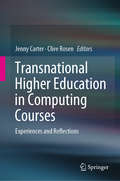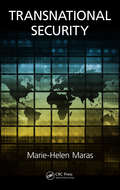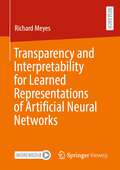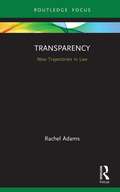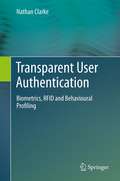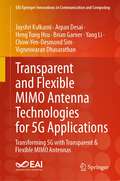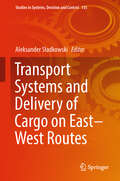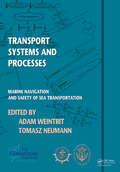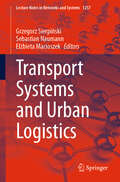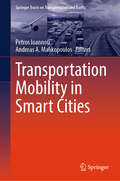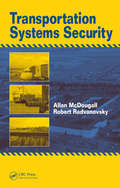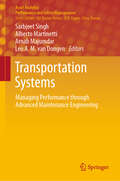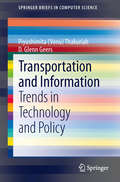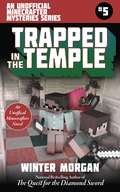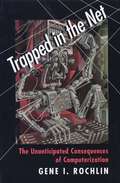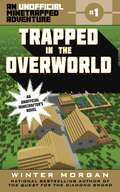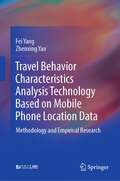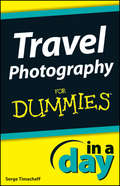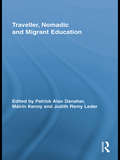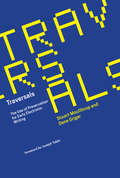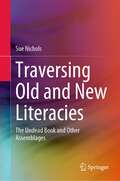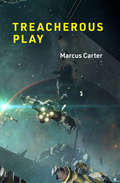- Table View
- List View
Transnational Education: Issues and Trends in Offshore Higher Education
by Christopher Ziguras Grant McBurnieWhile the international mobility of students is a well-established feature of higher education, the international mobility of institutions and courses on a large scale is a more novel phenomenon. Transnational education is at the leading-edge of the most fundamental changes taking place in higher education today. Topics discussed in this new volume include: the extent and form of offshore activity the pedagogical and cultural controversies that have plagued transnational education the challenges it presents to governments, educators and HE managers how governments are developing forms of regulation to integrate cross-border programs and branch-campuses into their strategic planning for the sector the new opportunities for students and institutions. Transnational Education presents a global perspective on the development of international online education, partner-supported transnational programs and international branch campuses. It provides a comprehensive and analytical account of the active role some universities are playing on the international stage and offers valuable guidance on future trends in the sector.
Transnational Higher Education in Computing Courses: Experiences and Reflections
by Jenny Carter Clive RosenThere has been exponential growth in transnational education (TNE) in the last few years as UK universities have looked to expand their markets. Recipient countries have sought short cuts to developing their higher education provision which has proved a lucrative income stream for some universities. But overseas collaborations are not without risk. Recipient countries can be concerned with external influence over curricula, quality being diluted and higher education being infected by neo-imperialism. These concerns are not without foundation. There are risks for providers too. Reputations can be damaged if academic standards are compromised. Conflicts of interest can occur between quality of provision and the pot of gold on offer. Staff can view overseas collaborations as distracting from their research and commitment to home students. Computing is a particularly popular subject for TNE, but critical thinking, analysis, independent learning, and creativity can be compromised. Preventing plagiarism is difficult. Constant changes in technology result in constant curricula revision which causes severe problems for overseas collaborations. This book focuses on TNE in the computing domain. However cross-cultural issues challenge TNE management and administration whatever the subject area. If the ever present tensions are not continuously monitored they can quickly threaten the sustainability of the collaboration. This book identifies many of the threats and some of the solutions. The readership for this book is truly global. Any international development officer in higher education considering an overseas collaboration will benefit from this book. Any academic becoming engaged in, or already involved with a TNE partnership, either as provider or recipient, will gain information and insight into the practice and issues. Researchers in TNE will discover more lines of enquiry. Students considering a course with an overseas provider or in coming to the UK to study will be better prepared thereby enabling a more fulfilling and rewarding experience. Anyone who has an interest in TNE, whether at the senior executive level, operational level, delivering programmes or as a recipient of TNE should read this book. The wealth of experience gathered here will provoke questions, prompt debate and offer solutions. It has been written by people who know the issues, bear the scars and are happy to share their knowledge. It will greatly benefit future transnational collaborations.
Transnational Security
by Marie-Helen MarasGlobalization and the easy movement of people, weapons, and toxins across borders has transformed security into a transnational phenomenon. Preventing transnational security threats has proven to be a very difficult challenge for governments and institutions around the world. Transnational Security addresses these issues, which are at the forefront
Transparency and Interpretability for Learned Representations of Artificial Neural Networks
by Richard MeyesArtificial intelligence (AI) is a concept, whose meaning and perception has changed considerably over the last decades. Starting off with individual and purely theoretical research efforts in the 1950s, AI has grown into a fully developed research field of modern times and may arguably emerge as one of the most important technological advancements of mankind. Despite these rapid technological advancements, some key questions revolving around the matter of transparency, interpretability and explainability of an AI’s decision-making remain unanswered. Thus, a young research field coined with the general term Explainable AI (XAI) has emerged from increasingly strict requirements for AI to be used in safety critical or ethically sensitive domains. An important research branch of XAI is to develop methods that help to facilitate a deeper understanding for the learned knowledge of artificial neural systems. In this book, a series of scientific studies are presented that shed light on how to adopt an empirical neuroscience inspired approach to investigate a neural network’s learned representation in the same spirit as neuroscientific studies of the brain.
Transparency: New Trajectories in Law (New Trajectories in Law)
by Rachel AdamsThis book critiques the contemporary recourse to transparency in law and policy. This is, ostensibly, the information age. At the heart of the societal shift toward digitalisation is the call for transparency and the liberalisation of information and data. Yet, with the recent rise of concerns such as 'fake news', post-truth and misinformation, where the policy responses to all these phenomena has been a petition for even greater transparency, it becomes imperative to critically reflect on what this dominant idea means, whom it serves, and what the effects are of its power. In response, this book provides the first sustained critique of the concept of transparency in law and policy. It offers a concise overview of transparency in law and policy around the world, and critiques how this concept works discursively to delimit other forms of governance, other ways of knowing and other realities. It draws on the work of Michel Foucault on discourse, archaeology and genealogy, together with later Foucaultian scholars, including Gayatri Chakravorty Spivak and Judith Butler, as a theoretical framework for challenging and thinking anew the history and understanding of what has become one of the most popular buzzwords of 21st century law and governance. At the intersection of law and governance, this book will be of considerable interest to those working in these fields; but also to those engaged in other interdisciplinary areas, including society and technology, the digital humanities, technology laws and policy, global law and policy, as well as the surveillance society.
Transparent User Authentication
by Nathan ClarkeThis groundbreaking text examines the problem of user authentication from a completely new viewpoint. Rather than describing the requirements, technologies and implementation issues of designing point-of-entry authentication, the book introduces and investigates the technological requirements of implementing transparent user authentication - where authentication credentials are captured during a user's normal interaction with a system. This approach would transform user authentication from a binary point-of-entry decision to a continuous identity confidence measure. Topics and features: discusses the need for user authentication; reviews existing authentication approaches; introduces novel behavioural biometrics techniques; examines the wider system-specific issues with designing large-scale multimodal authentication systems; concludes with a look to the future of user authentication.
Transparent and Flexible MIMO Antenna Technologies for 5G Applications: Transforming 5G with Transparent & Flexible MIMO Antennas (EAI/Springer Innovations in Communication and Computing)
by Yang Li Jayshri Kulkarni Arpan Desai Heng Tung Hsu Brian Garner Chow-Yen-Desmond Sim Vigneswaran DhasarathanThis book presents a comprehensive and in-depth exploration of the intricate design process and advanced modeling techniques employed in the creation of cutting-edge antenna geometries specifically tailored to meet the demands of Sub-6 GHz 5G wireless applications and communication systems. The authors provide valuable insights into the selection of flexible substrates, which serve as the foundation for the production of versatile antennas capable of seamlessly integrating into the rapidly evolving 5G and MIMO landscapes. Delving into the depths of antenna design, this book highlights the key aspects surrounding flexible MIMO antennas, showcasing their remarkable compatibility within compact spaces. The authors elucidate the intricacies involved in creating these antennas, illuminating their ability to adapt to challenging environmental conditions while maintaining exceptional performance. Furthermore, the authors delve into the fascinating realm of optimized flexible antenna arrays for MIMO systems, employing both transparent and non-transparent materials. The development of such arrays entails a meticulous optimization process, where a delicate balance between performance, form factor, and functionality is achieved. By shedding light on this complex process, the book equips readers with the knowledge and tools necessary to engineer high-performing, flexible antenna arrays for advanced wireless communication systems. The book embraces a broad scope by encompassing various substrate materials and fabrication techniques. This inclusive approach ensures its relevance and applicability to a wide range of readers, including novice researchers, postgraduate students, research scholars, as well as seasoned professionals and experts in the field of antennas hailing from diverse industries and academic institutions. Moreover, undergraduate students pursuing degrees in Communication Engineering, Electronics Engineering, and Antennas for Wireless Communication Systems will find this book to be an indispensable resource, offering highly pertinent and enlightening content that bridges the gap between theoretical concepts and real-world antenna design challenges.
Transport Systems and Delivery of Cargo on East–West Routes (Studies In Systems, Decision And Control #155)
by Aleksander SładkowskiThis book discusses the problems of delivering goods from East and South-East Asia to Europe, presenting the regional transport problems experienced in Italy, Slovakia, Russia, Georgia, Kazakhstan, Uzbekistan and Poland. The book is divided into two parts. The first part is devoted to the analysis of various issues in global logistics and regional transport, which operate in transport corridors. The second part of the book focuses on solutions to some of the technical and informatics problems related to the organization of transportation along the East–West routes. Intended primarily for professionals involved in various aspects of cargo delivery along the East–West routes, the book is also useful for manufacturers, technical staff at logistics companies, managers, students of transport-related subjects, as well as for a wide range of readers interested in the current state of transport in different countries.
Transport Systems and Processes: Marine Navigation and Safety of Sea Transportation
by Adam Weintrit Tomasz NeumannThe TransNav 2011 Symposium held at the Gdynia Maritime University, Poland in June 2011 has brought together a wide range of participants from all over the world. The program has offered a variety of contributions, allowing to look at many aspects of the navigational safety from various different points of view. Topics presented and discussed at th
Transport Systems and Urban Logistics (Lecture Notes in Networks and Systems #1257)
by Elżbieta Macioszek Grzegorz Sierpiński Sebastian NaumannThis book contains an abundance of numerical analyses based on significant data sets, illustrating the close affiliation between mobility and quality of life. What types of solutions can transform an urban zone into a Smart City? What parameters are important in the problem of optimizing supply strategies, especially at last-mile stage? How to use multi-criteria analysis when selecting parking locations? How to examine the condition of infrastructure and what impact it may have on delays in tram traffic? How to combine activities related to the suburbanization process with the integration of tariffs in public transport? This book provides you with answers to these and many other questions. With regard to the research results discussed and the selected solutions applied, the book primarily addresses the needs of three target groups: Scientists and researchers (ITS field) Local authorities (responsible for the transport systems at the urban and regional level) Representatives of business (traffic strategy management) and industry (manufacturers of ITS components). This book gathers selected papers presented at the 20th “Transport Systems. Theory and Practice” Scientific and Technical Conference organised by the Department of Transport Systems, Traffic Engineering and Logistics at the Faculty of Transport and Aviation Engineering of the Silesian University of Technology. The conference was held on 10–11 September 2024 in Katowice (Poland).
Transportation Infrastructure Engineering, Materials, Behavior and Performance: Proceedings of the 6th GeoChina International Conference on Civil & Transportation Infrastructures: From Engineering to Smart & Green Life Cycle Solutions -- Nanchang, China, 2021 (Sustainable Civil Infrastructures)
by Wynand JvdM Steyn Zhixin Wang Glynn HolleranSociety needs to travel to engage in productive and effective commerce, social, educational and related activities. Efficient travel is founded on an operational transport infrastructure system that is well-designed, engineering, constructed and maintained. This volume shares some of the latest innovations and thoughts in the areas of pavement infrastructure materials, behavior and performance. Access to this volume should enable the reader to gain an understanding of such novel information that should support improvements in the provision of an effective road transportation system for the benefit of the greater society served by the road network. The content is based on the contributions to the 6th GeoChina International Conference on Civil & Transportation Infrastructures: From Engineering to Smart & Green Life Cycle Solutions -- Nanchang, China, 2021.
Transportation Mobility in Smart Cities (Springer Tracts on Transportation and Traffic #21)
by Petros Ioannou Andreas A. MalikopoulosThis book covers multiple dimensions of future mobility systems in smart cities, mapping out the innovations that are needed, presenting ideas on how to address the challenges they present and exploring a holistic research path for future developments. The book considers the interaction between: technological developments in modes of transport and transportation systems like autonomous systems and shared mobility that lead to emerging mobility systems; the social behavior of the drivers and travelers who interact with these systems; and the institutional behavior of organized units such as the administrators responsible for the policies involved with transportation governance and regulation. Transportation Mobility in Smart Cities provides methods to analyze, design, and optimize a mobility system, taking into consideration this constellation of social and institutional factors as well as the necessary technological requirements. The result is a mobility system that will be acceptable to travelers without imposing undue inequities in transportation on the smart city. The holistic approach taken in addressing the problems involved with establishing a mobility system within a smart city makes this book attractive to researchers and practitioners, technologists, and policy makers alike. Graduate students working in areas connected with the evolution of transportation systems will also find the material presented in this book instructive.
Transportation Systems Security
by Allan McDougall Robert RadvanovskyHighlighting the importance of transportation to a country‘s infrastructure and survival, Transportation Systems Security presents the strategic and practical considerations involved in the implementation of physical, procedural, and managerial safeguards required to keep all modes of transportation up and running during an actual or potenti
Transportation Systems: Managing Performance through Advanced Maintenance Engineering (Asset Analytics)
by Sarbjeet Singh Alberto Martinetti Arnab Majumdar Leo A. M. van DongenThis book explores the application of breakthrough technologies to improve transportation performance. Transportation systems represent the “blood vessels” of a society, in which people and goods travel. They also influence people’s lives and affect the liveability and sustainability of our cities. The book shows how emergent technologies are able to monitor the condition of the structure in real time in order to schedule the right moment for maintenance activities an so reduce the disturbance to users.This book is a valuable resource for those involved in research and development in this field. Part I discusses the context of transportation systems, highlighting the major issues and challenges, the importance of understating human factors that could affect the maintenance operations and the main goals in terms of safety standards. Part II focuses on process-oriented innovations in transportation systems; this section stresses the importance of including design parameters in the planning, offering a comparison between risk-based and condition-based maintenance and, lastly, showing applications of emergent technologies. Part III goes on to reflect on the technical-oriented innovations, discussing the importance of studying the physical phenomena that are behind transportation system failures and problems. It then introduces the general trend of collecting and analyzing big data using real-world cases to evaluate the positive and negative aspects of adopting extensive smart sensors for gathering information on the health of the assets. The last part (IV) explores cultural and behavioural changes, and new knowledge management methods, proposing novel forms of maintenance and vocational training, and introduces the need for radical new visions in transportation for managing unexpected events.The continuous evolution of maintenance fields suggests that this compendium of “state-of-the-art” applications will not be the only one; the authors are planning a collection of cutting-edge examples of transportation systems that can assist researchers and practitioners as well as students in the process of understanding the complex and multidisciplinary environment of maintenance engineering applied to the transport sector.
Transportation and Information
by D. Glenn Geers Piyushimita Vonu ThakuriahTransformations in wireless connectivity and location-aware technologies hold the promise of bringing a sea-change in the way transportation information is generated and used in the future. Sensors in the transportation system, when integrated with those in other sectors (for example, energy, utility and health) have the potential to foster novel new ways of improving livability and sustainability. The end-result of these developments has been somewhat contradictory. Although automation in the transportation environment has become increasingly widespread, the level of involvement and active participation by people, in terms of co-creation and contribution of information, has also increased. As a result, the following two major trends have been observed: (1) increases in Machine-to- Machine (M2M) communications; and (2) increases in the variety and volume of User-Generated Content. In this transportation paradigm, the pervasive use of Information and Communication Technologies will serve as the foundation for mobility intelligence towards an "ubiquitous information-centered mobility environment". However, many technical and operational questions, as well as social, management and legal challenges present themselves in the transformation to this vision. The book presents a non-technical review of research and initiatives and a discussion of such opportunities and challenges.
Trapped In the Temple (Unofficial Minecraft Mysteries #5)
by Winter MorganAs Edison and Billy’s fame grows, they find themselves sought out by young Princess Hannah. Her pet ocelot is trapped in a luxurious desert temple, and she needs their help to bring her pet home. They accept the job, but quickly discover that there is far more going. When they arrive in the desert, they learn that the whole town has been abandoned, and they have to work with Princess Hannah to find not only her beloved pet, but her friends and family, too!Join Edison and Billy as they travel to the desert to help Princess Hannah in the fifth installment of the Unofficial Minecraft Mystery series!
Trapped in the Net: The Unanticipated Consequences of Computerization
by Gene I. RochlinVoice mail. E-mail. Bar codes. Desktops. Laptops. Networks. The Web. In this exciting book, Gene Rochlin takes a closer look at how these familiar and pervasive productions of computerization have become embedded in all our lives, forcing us to narrow the scope of our choices, our modes of control, and our experiences with the real world. Drawing on fascinating narratives from fields that range from military command, air traffic control, and international fund transfers to library cataloging and supermarket checkouts, Rochlin shows that we are rapidly making irreversible and at times harmful changes in our business, social, and personal lives to comply with the formalities and restrictions of information systems. The threat is not the direct one once framed by the idea of insane robots or runaway mainframes usurping human functions for their own purposes, but the gradual loss of control over hardware, software, and function through networks of interconnection and dependence. What Rochlin calls the computer trap has four parts: the lure, the snare, the costs, and the long-term consequences. The lure is obvious: the promise of ever more powerful and adaptable tools with simpler and more human-centered interfaces. The snare is what usually ensues. Once heavily invested in the use of computers to perform central tasks, organizations and individuals alike are committed to new capacities and potentials, whether they eventually find them rewarding or not. The varied costs include a dependency on the manufacturers of hardware and software--and a seemingly pathological scramble to keep up with an incredible rate of sometimes unnecessary technological change. Finally, a lack of redundancy and an incredible speed of response make human intervention or control difficult at best when (and not if) something goes wrong. As Rochlin points out, this is particularly true for those systems whose interconnections and mechanisms are so deeply concealed in the computers that no human being fully understands them.
Trapped in the Overworld (The Unofficial Minetrapped Adventure #1)
by Winter MorganSimon, Michael, and Lily are playing on a multiplayer server when a strange lightning storm hits their town. In the middle of an intense game, a bolt of lightning strikes, sucking the three friends into the game! They discover that they’ve been transformed into their Minecraft characters. They try to escape, but they are trapped in the Overworld!While battling other players and hostile mobs, Simon, Michael, and Lily try to find a way home. Just when they are ready to give up, their town is attacked and Simon’s Minecraft home is destroyed. The friends now have to find out who is terrorizing them, and if the same person is responsible for trapping them in the game.If the trio can find and defeat the evil villain, will they finally be able to make a home in their favorite game? It’s a battle against an unknown enemy in this first installment of the new Unofficial Minetrapped Adventure series.Sky Pony Press, with our Good Books, Racehorse and Arcade imprints, is proud to publish a broad range of books for young readers-picture books for small children, chapter books, books for middle grade readers, and novels for young adults. Our list includes bestsellers for children who love to play Minecraft; stories told with LEGO bricks; books that teach lessons about tolerance, patience, and the environment, and much more. While not every title we publish becomes a New York Times bestseller or a national bestseller, we are committed to books on subjects that are sometimes overlooked and to authors whose work might not otherwise find a home.
Tras la pista invisible: 8 misterios sin resolver narrados por Paulettee
by PauletteeUn libro para verdaderos Misters.. Una maleta abandonada en medio del zócalo en Ciudad de México, tres hermanos que salieron a la playa y nunca volvieron, la muerte de una reconocida actriz o el fatídico desenlace de una secta religiosa son apenas una parte de lo que los Misters podrán encontrar en Tras la pista invisible, el primer libro de relatos de Paulettee, la reina del misterio. La crítica ha dicho: 'Celebro y sigo el contenido digital de Paulettee desdesiempre porque tiene investigación y esfuerzo periodístico, y este libro es la prueba de ello: ocho historias, narradas de manera ágil, que dejarán los pelos de punta a quienes las lean. (Y a quienes aún tienen pelo, claro)'. Daniel Samper Ospina
Travel Behavior Characteristics Analysis Technology Based on Mobile Phone Location Data: Methodology and Empirical Research
by Fei Yang Zhenxing YaoThis book is devoted to the technology and methodology of individual travel behavior analysis and refined travel information extraction. Traditional resident trip surveys are characterized by many shortcomings, such as subjective memory errors, difficulty in organization and high cost. Therefore, in this book, a set of refined extraction and analysis techniques for individual travel activities is proposed. It provides a solid foundation for the optimization and reconstruction of traffic theoretical models, urban traffic planning, management and decision-making. This book helps traffic engineering researchers, traffic engineering technicians and traffic industry managers understand the difficulties and challenges faced by transportation big data. Additionally, it helps them adapt to changes in traffic demand and the technological environment to achieve theoretical innovation and technological reform.
Travel Photography In A Day For Dummies (In A Day For Dummies)
by Serge TimacheffTake better travel shots on your next vacation with this terrific, 100-page e-book! From pro to hobbyist, from short weekends to dream vacations, every photographer wants to be able to capture memorable and compelling travel photos. Now you can hit the road with this fast-paced, In A Day For Dummies e-book that really zeros in on how to best capture eye-popping travel photos. Find out how to set your camera, make adjustments on the fly, prepare for all kinds of light--even get great shots with your smartphone. You'll go through this handy e-book in a day, and capture photos for a lifetime. Focuses on techniques for capturing fantastic travel photos, no matter where you are or what kind of camera Covers setting the camera for the shot, making adjustments on the fly, lighting and composition, using a smartphone camera, and editing and sharing your photos Includes a "Beyond the book" online component, where you can find step-by-step tutorials, videos, and a bonus lesson on creating a high-dynamic range travel photo Online extras also include a photo book, how to make money selling your photos, and a gallery of unique travel photos to inspire you Get Travel Photography In A Day For Dummies, grab your camera, and hit the road!
Traveller, Nomadic and Migrant Education (Routledge Research in Education)
by Patrick Danaher Máirín Kenny Judith LederTraveller, Nomadic and Migrant Education presents international accounts of approaches to educating mobile communities such as circus and fairground people, herders, hunters, Roma and Travellers. The chapters focus on three key dimensions of educational change: the client group moving from school to school; those schools having their demographics changed and seeking to change the mobile learners; and these learners contributing to fundamental change to the nature of schooling. The book brings together decades of research into the challenges and opportunities presented by mobile learners interacting with educational systems predicated on fixed residence. It identifies several obstacles to those learners receiving an equitable education, including negative stereotypes and centuries-old prejudice. Yet the book also explores a number of educational innovations that bring mobility and schooling together, ranging from specialised literacy programs and distance and online education to mobile schools and specially trained teachers. These innovations allow us to think differently about how education can and should be, for mobile and non-mobile learners alike.
Traversals: The Use of Preservation for Early Electronic Writing (The\mit Press Ser.)
by Stuart Moulthrop Dene GrigarAn exercise in reclaiming electronic literary works on inaccessible platforms, examining four works as both artifacts and operations.Many pioneering works of electronic literature are now largely inaccessible because of changes in hardware, software, and platforms. The virtual disappearance of these works—created on floppy disks, in Apple's defunct HyperCard, and on other early systems and platforms—not only puts important electronic literary work out of reach but also signals the fragility of most works of culture in the digital age. In response, Dene Grigar and Stuart Moulthrop have been working to document and preserve electronic literature, work that has culminated in the Pathfinders project and its series of “Traversals”—video and audio recordings of demonstrations performed on historically appropriate platforms, with participation and commentary by the authors of the works. In Traversals, Moulthrop and Grigar mine this material to examine four influential early works: Judy Malloy's Uncle Roger (1986), John McDaid's Uncle Buddy's Phantom Funhouse (1993), Shelley Jackson's Patchwork Girl (1995) and Bill Bly's We Descend (1997), offering “deep readings” that consider the works as both literary artifacts and computational constructs. For each work, Moulthrop and Grigar explore the interplay between the text's material circumstances and the patterns of meaning it engages and creates, paying attention both to specificities of media and purposes of expression.
Traversing Old and New Literacies: The Undead Book and Other Assemblages
by Sue NicholsThis book re-examines the field of New Literacy Studies and promotes a shift away from binary constructions of literacies as 'old' or 'new' and to encourage critical reflection on the part of readers as to the uses of these constructs. First, the book examines the entanglement of pasts, presents and futures in contemporary literacy practices. Second, it considers representations of literacies as actors, having their own power and consequences. Third, it critically examines the place of 'new' and 'old' literacies in a marketplace in which social, economic and political power advantage is contested. The book demonstrates the use of assemblage theory drawing on semiotics, geo-semiotics and Actor Network Theory for analyzing literacies as assemblages. It provides readers with tools of analysis with which to interrogate claims made for the value of literacy, innovations and traditions alike. It also discusses implications for literacy policy, curriculum, teacher education and research.
Treacherous Play (Playful Thinking)
by Marcus CarterThe ethics and experience of &“treacherous play&”: an exploration of three games that allow deception and betrayal—EVE Online, DayZ, and Survivor.Deception and betrayal in gameplay are generally considered off-limits, designed out of most multiplayer games. There are a few games, however, in which deception and betrayal are allowed, and even encouraged. In Treacherous Play, Marcus Carter explores the ethics and experience of playing such games, offering detailed explorations of three games in which this kind of &“dark play&” is both lawful and advantageous: EVE Online, DayZ, and the television series Survivor. Examining aspects of games that are often hidden, ignored, or designed away, Carter shows the appeal of playing treacherously. Carter looks at EVE Online&’s notorious scammers and spies, drawing on his own extensive studies of them, and describes how treacherous play makes EVE successful. Making a distinction between treacherous play and griefing or trolling, he examines the experiences of DayZ players to show how negative experiences can be positive in games, and a core part of their appeal. And he explains how in Survivor&’s tribal council votes, a player&’s acts of betrayal can exact a cost. Then, considering these games in terms of their design, he discusses how to design for treacherous play. Carter&’s account challenges the common assumptions that treacherous play is unethical, antisocial, and engaged in by bad people. He doesn&’t claim that more games should feature treachery, but that examining this kind of play sheds new light on what play can be.

